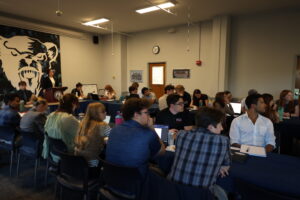Political Science professor Amy Fried held an open lecture to discuss what will appear on the ballot as Question 5, along with the rest of the Maine’s 2016 statewide ballot, as part of the University of Maine’s Socialist-Marxist Studies fall lecture series. The event occurred on Wednesday, Oct. 26 in the Bangor Room of the Memorial Union, from 12:30 to 1:50 p.m.
Fried is chair of the Department of Political Science at the University of Maine, focusing her studies on the historical and political effect of public opinion in the United States.
“Question 5 is different from the other referenda on the ballot,” Fried said. “Because it’s not just about the regular policy, it’s really about the process of voting.”
Maine’s Question 5, titled “An Act to Establish Ranked-Choice Voting,” will appear on the ballot as follows: “Do you want to allow voters to rank their choices of candidates in elections for U.S. Senate, Congress, Governor, State Senate, and State Representative, and to have ballots counted at the state level in multiple rounds in which last-place candidates are eliminated until a candidate wins by majority?”
Ranked-Choice Voting (RCV), also known as Instant-Runoff Voting, is the proposed solution to the “spoiler effect” commonly seen in Maine state elections, where one candidate would win, despite not earning the 50% majority of the vote, due to votes being split between two or more opposing candidates.
The last time a Maine gubernatorial election was won by a majority of votes in their first term of office was Kenneth M. Curtis in 1966. If Question 5 passes, Maine citizens would use RCV to vote for Governor, the U.S. Senate and House of Representatives and the Maine Senate and House of Representatives. While certain cities, such as Portland, already use RCV today, if Question 5 passes, Maine would be the first state to adopt the system statewide.
Currently, the Maine Constitution strictly defines that a candidate needs to reach a plurality of votes, not a majority of votes, to be determined the winner. This means the candidate with the largest number of votes, not necessarily the one with an absolute majority.
After the explanation of the voting system, Fried described its potential benefits.
“Research seems to show that yes, you do have more civility in elections and less negativity in campaigns, the argument being that you don’t want to turn off the supporters of another candidate because they might pick you as their second choice,” Fried said.
Fried was not content with only discussing the benefits, however and took time to mention the potential downsides of Question 5’s passage.
“With many candidates there can be something called ballot exhaustion. Also, it’s possible the composition of the electorate could change. You could have less voting compared to past elections, from voters who have lower levels of education and a lower income because it is a more complicated system. People would have to really do a good job with voter education. To me, that’s the big takeaway if this passed,” Fried said.
Maine voters will decide on whether they want to adopt the RCV system on Nov. 8.










